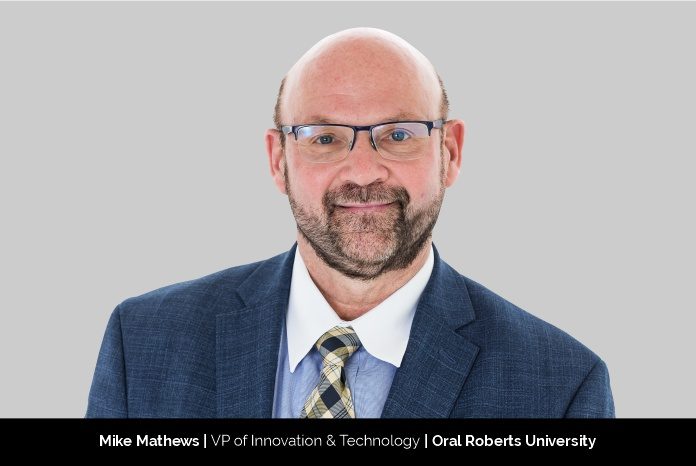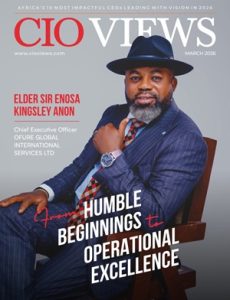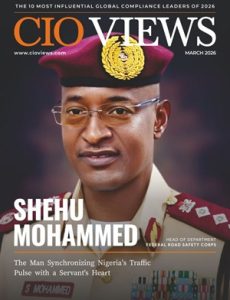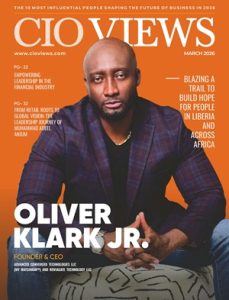Through an AI-Enabled Mirrored Intelligence
Michael L. Mathews
The original Artificial Intelligence (AI) Enabled MQ-Mirror application was designed at Oral Roberts University by Larry Moss, Jesupelumi Wickliffe, and Michael Mathews. The human fascination with the mirror combined with the emergence of AI, virtual digital assistants, machine learning, eLearning, and 5G connectivity allows the human being to become front-and-center instead of the technology itself. Up to this point in the history of computers, the device has taken center stage to the human being. This has caused may undesired social, physical, and psychological outcomes. We have allowed the labeling of technology 1.0, 2.0, 3.0 etc. versus a focus on civilization 1.0, 2.0, 3.0.
Reversing the reality that human beings have been secondary to technology gives Jesupelumi and Michael a special feeling of accomplishment. Mathews states ‘To see world renown Dr. Jason Beaman leverage and advance the use of the MQ-Mirror is a life-long dream.’ Wickliffe adds ‘Imagine the future of the MQ-Mirror considering that Dr. Beaman specializes in Psychiatry, Forensic Psychiatry, Addiction Medicine, Opioid abuse, Neurobiology of Psychosis, mass shootings, and family violence. Mathews can be seen below standing in front of the MQ-Mirror in Dr. Jason Beaman’s Office as a team of ORU employees brought the MQ-Mirror to OSU.


The MQ-Mirror brings the power of IQ, EQ, and now MQ together via a glass mirror. The mirror integrates a mini-processor, IoT, AI, digital assistant and the entire university digital ecosystem. Students are able to access all campus services and engage with the entire campus environment as a life-size digital assistant. The MQ-Mirror was recently shown to colleges and universities from 22 European countries, who all endorsed the break-through concept, including a new partnership with the University of Latvia. A student below speaks into the mirror the word ‘Who am I’ and the mirror echoes back both an audio and textual message on the mirror.

The MQ-Mirror enhances the way humans interact with intelligence
The MQ-Mirror application allows students to audibly and textually interact with personal data, global-communications, self-navigation, self-help, data analytics, music, video, education, fitness, artificial intelligence and robotic functionality via the glass mirror interface. The new form-factor of a glass mirror has all the attributes to fully engage human-to-digital-and-visual interaction. The glass mirror combined with the small new computer design hidden within the mirror frame has made significant advancements in personal fitness by combining the mirror, smartphone, and wearable watch. All three synchronized together provide a premier digital experience that accesses personal data, AI, machine learning data, personal trainers, eCourses, and text to speech narration. The mirror itself provides the real-life experience of both virtual and augmented reality (Mirrored Reality). The Figure-1 below shows one of the first Fitness Mirrors[i] as one of the first mirror form-factor designs. The mirror allows the trainee to verbally or physically activate the digital applications packaged in the mirror. They can connect to a live personal trainer, take an online course pertaining to fitness, and display all the vital attributes of big data-to-personal data.
The Future of Mirrored Reality as the Future Form Factor
With the computer-processing and IoT within the mirror integrated with artificial intelligence and instant access to the world of knowledge, a human is now at the center of the technology versus the device. The human along with the mirror personalizes all experiences and engagements by opening a portal into the digital world. Figure-1 below represents the engagement of the whole person engaging with themselves mapped against visual data in a visual and audible fashion. The computer functionality behind the glass mirror mixed with personalized AI/Machine Learning allows the mirror to perform everything that a computer can. Universities like Oral Roberts University who have integrated wearable watches and all educational success factors can now simply integrate them to the mirror. These universities who have completed their digital transformation projects are now able to move everything to the new form-factors such as the smart mirrors and smart glasses. In essence, they are making a subset of the ‘Smart Campus’ and providing ‘Everything-as-a-Service’ from their own ecosystem.

With a glass mirror capable of engaging and mirroring the human actions with all the integrations of AI, machine learning, deep learning, social media, online instruction, social skills, personal skills, wearables, cameras, speech-to-text, etc. the mirror becomes ‘intelligent’ and fully integrated with the human being. This new form-factor may slow down and even reverse the new research proving that extensive engagement with Smartphones is causing depression and anxiety.
The fascination with mirrors and ourselves has been around for centuries. This fascination has caused many people to decry ‘vanity’ as people spend endless hours envisioning who they are or who they could be — compared to what they have imagined in their mind. In the year 2019 we are now capable of seeing and expressing ourselves against all the worlds of known truths, knowledge, intelligence, and data that allow interactions with people, people groups, and solutions for education, beauty, wisdoms, and solutions for addictions, etc.
Engaging a real human being that can visually and physically interact with the entire virtual universe of knowledge, wisdom and truth has endless possibilities. Just as the smartphone form-factor transitioned the way humans digitally interact with a computer, themselves, and each other; the Intelligent Mirror Reality will visually and digitally transition the way the world of knowledge and society engage. However, the focus will be on the human side versus the device side of intelligence.
The MQ-Mirror Application usage at Oral Roberts University has already been named ‘Everything-as-a-Service’ by CIO Magazine as one of the next concepts on a campus and across any enterprise. [ii]
An individual will be able to wake up in the morning and interact with the MQ-Mirror and say ‘Alexa, what was my productivity yesterday?’ The digital assistant with Alexa AI will be able to report all personalized productivity items that the individual feels as productive or important; such as sleep patterns, fitness ratings, heart rate, 401K, monthly budget to date, tasks completed, and individual smartphone utilization – followed by suggested tips for the day. With the MQ-Mirror having the same mobile apps synced with the smartphone, the individual can tell Alexa to order their favorite Starbucks drink at the nearby Starbucks. The machine learning with the AI software will begin the journey of learning the nuances, likes, and dislikes of the individual in order to advance the engagements and suggestions – because technology should be about the person vs. the device. Students will be able to instantly ask and display all the student success factors that help them understand, navigate, and set daily and personal goals for their academic achievement.
Below you can see Larry Moss and Dr. Jason Beaman beginning their training session on how to program the MQ-Mirror.






